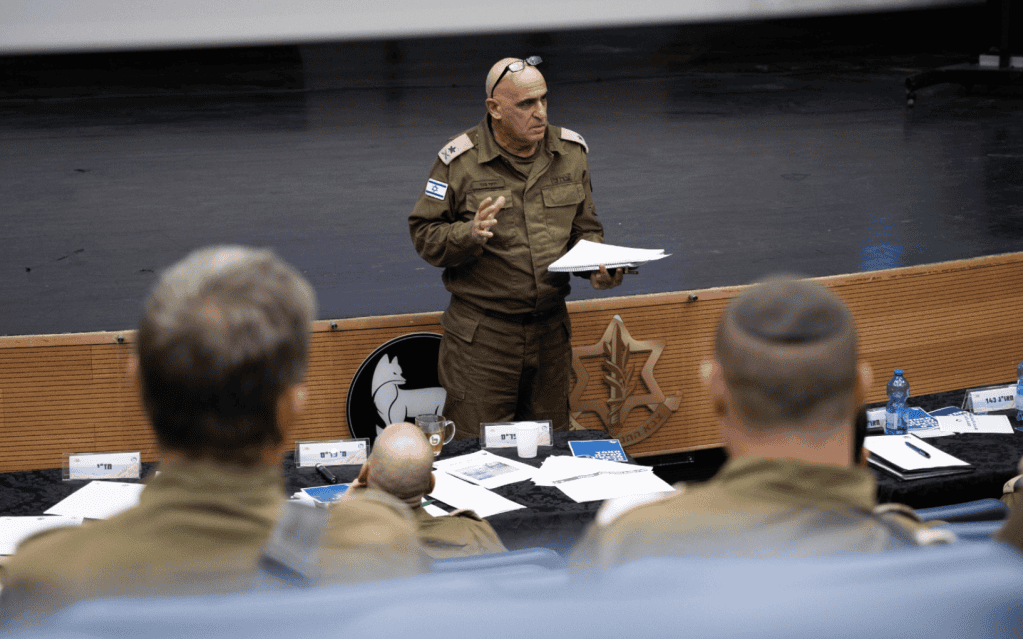
IDF Southern Command conducted an operational forum focused on lessons learned on November 27. (Courtesy IDF)
Overnight on November 27, eleven hostages were freed by Hamas and made their way to Israel through the Kerem Shalom border crossing with Egypt. Twelve more hostages were released on November 28 in the early evening by Hamas and Islamic Jihad.
The hostages that were released on November 27 arrived in Israel after midnight on Tuesday, completing the deal with Hamas that began on Friday, November 24, that saw fifty hostages freed in exchange for 150 prisoners released by Israel. Hamas also released seventeen Thai citizens and one Filipino citizen, as well as one dual Russian-Israeli citizen in the first four days. The additional hostages and foreign nationals released on November 28 constitute the first day of extending the pause, described as a ceasefire in the region. The deals for the Thai, Filipino, and Russian were separate from the Hamas-Israel deal for four days of pause in fighting. Thailand had worked with Iran to secure the release of the hostages that Hamas took on October 7 during its attack on Israel. Hamas also released the Russian citizen as a gesture to Moscow.
The hostage deal is now expected to be extended further during the week, and each day of extension should bring the release of ten more hostages. Israel has concentrated on releasing children and women hostages from Gaza. Twenty children were released in the first four days of the pause in fighting. On Tuesday, November 28, 12 hostages were released. These included ten Israelis and two foreign nationals.
Tensions in Gaza grew on Tuesday. The IDF said that “three explosive devices were detonated adjacent to IDF troops in two different locations in the northern Gaza Strip, violating the framework of the operational pause. In one of the locations, terrorists also opened fire at the troops, who responded with fire.” Soldiers were lightly injured in the incidents, which are the first significant violations of the ceasefire that Hamas and the IDF have observed since Friday morning. “In both incidents, the troops were located in positions as per the framework of the operational pause,” the IDF said.
IDF Chief of Staff, Herzi Halevi, went to northern Israel on Tuesday, one day after Israel Defense Minister Yoav Gallant also visited the north. Halevi met with soldiers and spoke about the importance of returning all the remaining hostages to Israel. Gallant and Halevi have both stressed that Israel’s ground operations in Gaza, which began on October 27, brought the pressure on Hamas necessary to release hostages. Halevi said it was “evidence of the results of significant military pressure and resolute ground operations, which created the conditions for the return of our civilians home.” He also said the IDF was using the pause in fighting to learn, strengthen, and improve future operational plans.
Halevi, like Gallant, also stressed the importance of returning Israeli residents to the 42 border communities and one city evacuated along the border with Lebanon. Israel evacuated these communities in October due to daily attacks from Hezbollah. The assaults included rocket fire, mortar strikes, and anti-tank fire. “We are here in northern Israel, and from here, I want to address the residents of the north who have been evacuated from their homes for some time – I know how difficult, uncomfortable, and filled with great uncertainty the situation is,” Halevi said. He said that he would ensure that residents of the north return to a “different, better and more stable security reality.” He also discussed the importance of accountability for the intelligence failures before the Hamas attack on October 7. “The IDF and within it the Intelligence Directorate, failed in the events of October 7. There will be fundamental and deep investigations, but for now, we must focus on the fighting,” he said.
Israel’s Southern Command also held a meeting on Monday, November 27, to discuss lessons learned. It was attended by Southern Command head Major General Yaron Finkelman. The IDF said that, in addition to division and brigade commanders, the head of the ground forces and the commander of the Israeli Air Force attended. “The commanders focused on combat techniques, operational discipline, IDF soldiers’ operations, and insights into enemy activity,” the IDF said in a statement on Tuesday, November 28. The meeting in Southern Command and the visits to the North illustrate how Israel uses the operational pause to learn, listen, and communicate messages to the various units in the field.
Israel’s governing coalition also submitted an $8.14 billion budget for a month and a half to meet the needs of the war. This includes budgets for the IDF, police, families of the hostages and evacuated families, as well as other needs, the Prime Minister’s Office said in a statement. In contrast, the fifty-day war against Hamas in 2014 was estimated to cost as much as $3.6 billion. In that war, Israel didn’t need to evacuate communities, and there was no similar large hostage crisis.
The IDF continues daily operations in the West Bank during the pause in Gaza. While the pause has brought quiet to the north and the Gaza area, the West Bank is under close watch. On the evening of November 27, I accompanied an IDF reserve battalion in a region of the West Bank that overlooks Israel’s coastal plain. The unit secured the village of Deir Ammar, where IDF combat engineers demolished the floor of a house where a terrorist named Daoud Fayez resided. The IDF uses home demolitions to deter terrorists, a practice that has origins in the British Mandate prior to Israel’s foundation in 1948.
In addition, the IDF released the names of three soldiers who fell on October 7 or in the days after and whose bodies are believed to be in Gaza. This brings the total IDF losses to 395 since the war began.







